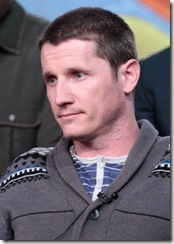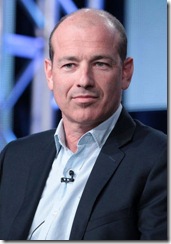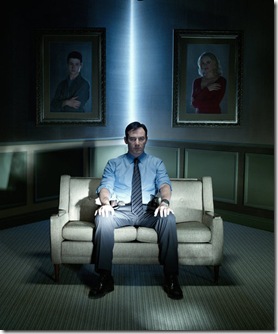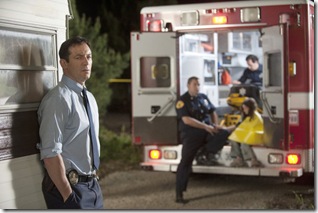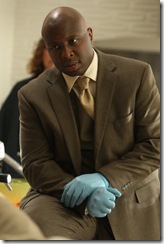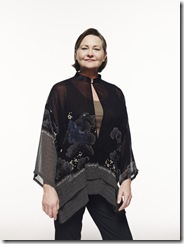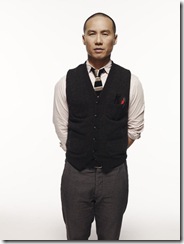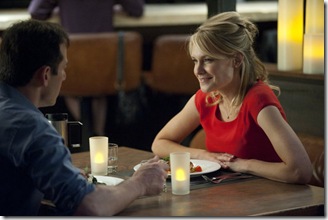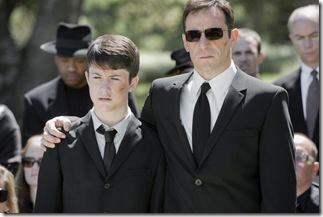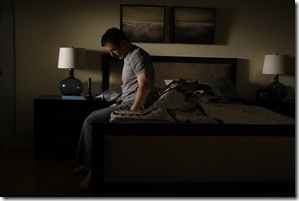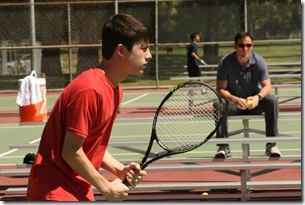Awake [NBC, Thursdays, 10/9C]is a unique new series that revolves around a police detective who is in an automobile accident with his wife and son. When he awakens, it is to discover that his son has died – but when he goes to sleep, the next time he opens his eyes, he is in a world where it’s his wife who died. In each world, he has a partner and a therapist – making for two separate casts of characters and two crimes to be investigated each week. And then stuff begins to bleed from one world to the other.
Is the show about parallel universes? A real world and a dream world? Awake’s creator Kyle Killen [Lone Star] and fellow executive producer Howard Gordon [Homeland, 24] spoke to a number of journalists/bloggers and talked about just that – and, of course, a whole lot more.
Hi guys thanks for doing the call. I am really excited about the show it looks great so I can’t wait to see it. So first Kyle can you kind of talk about just how you came up with the whole concept of the series?
Kyle Killen: Sure I think, you know, it had some things in common with the last series Lone Star and when that ended I think probably some of those questions of duality and trying to make a go of living a life in two spaces was still floating around in my head.
So that was something that was still of interest to me and this seemed like a good vehicle for exploring a lot of that. And then, you know the concept of the way your dreams feel real, the way you seem to experience them as something that you don’t blink at until something crazy happens that sort of bursts that balloon.
I think I became interested in the question of what if nothing ever popped that balloon. What if you couldn’t tell the difference between when you were awake and when you were asleep? And then I started looking for a way to marry those two ideas up and a few months later we had Awake.
And can you both talk a little bit about how you decided on casting and everything for the series?
Killen: Howard do you want to jump on that one?
Howard Gordon: Well we obviously started with the lead, Michael Britten since he had to shoulder so much of the story.
And actually at the very beginning we were afraid until we decided we could actually break point of view. It seemed that he might have to be in every scene which for anybody who has ever done hour long television knows that’s, you know, pretty impossible.
Anyway there is a very short list of leading men of a certain age, who are substantial and who Jason Isaacs was at the very top of that list and we were lucky enough to get him.
I mean we met with him. I had met with him a couple of months before just simply as a general (unintelligible)? And I know he was very sketchy about whether he wanted to do television. And he was intrigued as I was by Kyle’s pilot and he jumped in.
And from there build out the molecule. Who worked with, you know, your lead. And so (unintelligible) and BB were slightly different. Well BB was (unintelligible) I think wasn’t he Kyle?
Killen: Yes he was pretty much what was called for.
Yes let me ask this to Kyle first and then Howard because it applies to both of you. We have seen a real trend this year of people who made very serialized shows in the past. This time making a show in which they made sure it was something the story that ended after every hour.
The people who had made Heroes are doing that. The people who made Lost were doing that and certainly you guys with Lone Star and 24 both made shows that before were very serialized.
And this one although it is serialized in one way it looks like you are absolutely going to solve a crime or maybe two cases every single episode. Do you see that as a real thing? Is that kind of a priority now that people realized well maybe the audience wants something to end at the end of each hour?
Killen: I think, you know, both the shows you referenced. This is Kyle.
Yes.
Killen: Lost and 24, you know, they inspired a lot of imitators that tried to do the same thing and didn’t meet with success. I think the risk with a completely serialized show is that your audience is all in or all out.
Yes.
Killen: And, you know, that is a tremendous gamble. So I think being able to – we are very interested in the serialized elements of the story but we also recognize that in the fractured landscape of television today it is hard to get everybody to commit Week 1.
And what you really want to do is leave the door open so that people, you know, hopefully the good word filters out and people can come to it without feeling like well I’m already hopelessly behind so I give up on that.
Or maybe I would – if it goes a second or third year I’ll catch up on DVD. Like leaving, promising people that if Week 6 is the first week that you watch, you are going to get a satisfying hour of television that you can completely follow and understand.
And hopefully that experience makes you excited about going back and catching up. I just think the trend is towards making sure that your audience has an opportunity even if they are not there Week 1.
Okay thanks. Let me just ask Howard the same thing because Howard obviously 24 was one of the ultimate serialized shows but do you also have a feeling now that it is important to have something wrap up with each hour and make people be able to come in later on?
Gordon: Yes I think Kyle is exactly right and I think the, you know, having done 24 and having recognizing from inside how nearly it impossible it was and that particular (unintelligible) worked in a densely serialized format.
The barrier to entry that it creates and there’s also the one thing I’d add to what Kyle said is that there is a mercenary aspect to it as well which is shows that you can occasionally watch or sporadically watch are more syndicatable.
So there is a, you know, the studio is more incentivized to do shows that have standalone, you know, beginnings, middles and ends.
Howard question for you. I’ve got a copy of “Hard Target” here and a stack of books that – I haven’t read it yet but it is in a stack of things that I’m, you know, in line to get to.
At first, how can you find time to run TV shows and write books too? Is writing books going to become something that you are passionate enough about that TV might lose you one day?
Gordon: Well at some point I think, you know, everybody has to know when to hang up their six guns and walk off into the sunset at some point. You know, I have been doing this for a long time so that is certainly on the table as a possibility.
And in this case it was just something I did. I started doing during the writer’s strike, you know, not being a big believer in idle hands. So I just – I started it and to answer your question, I did it in the margins of my day job which I think was ill advised. So you may want to stick that in the middle of your stack somewhere.
I’m very happy and I am very proud of it and it was a lot of fun to do it but it I was done very much in the margins, in the early mornings and late nights and kind of weekends of the last three years.
I had a very forgiving publisher who happened to be a 24 fan who let me, you know, make sure that I attended to my – to Jack Bauer before I finished the book.
Hi guys. I hope you do really well with the show. I’ve been excited with what I have seen of it.
And I am just curious if you could just wrap it up in a nutshell as to how you explain the show? Because to me, the therapists are saying it is not a dream and yet it is almost like a parallel universe where we are in two different worlds. Could you elaborate on that?
Killen: Sure I mean it is essentially, you know it is a detective who has experienced the tragic accident and he has lost either his wife or his son. One of those worlds is real and the other is a dream that he has created to compensate for it.
But the therapists in each world argue that their world is reality and the other one is a fiction created by his brain and ultimately you know what we see in the pilot episode is that he is actually less interested in figuring out what’s real and what’s not than maintaining those two worlds.
Because as long as he has got both of them he has got access to his wife and his son then he hasn’t really lost anything. And the upshot for a detective living across two worlds is that he discovers that the cases in one seems to sort of be reflected or replicated in the other.
And that provides him with insight and clues that allow him to do his job differently than he did before and, you know, differently than any other detective that we have gotten to see on television.
Oh wonderful. That sounds great. Now can you tell us about any upcoming guest stars?
Gordon: Well – this is Howard speaking. We have a wonderful casting director, Cami Patton, who has given us some fresh faces and some faces that, you know – one person who as a standout is Brianna Brown who will be in the third episode, you know, the pilot one as one of the three. I don’t know which one.
Brianna Brown is somebody who is terrific. Kyle can you think of anybody else who…
Killen: We’ve got Kevin Weisman from Alias. He did a long arc at the end of our season. He is in the last three episodes.
And then Laura Innes from The Event and ER is someone that I think originally came on for a sort of a guest spot but we ended up really building out that role so she is in numerous episodes and has a really big part in arc for the season.
So in the show Michael has these two separate realities that are similar in some ways and different in other ways. Can you talk about how you guys keep track of all of that from the writing and production side of things?
Killen: It’s – that absolutely was one of the trickier elements of like getting started. We found that we would get confused when discussing what we were – what someone was pitching or talking about.
So we have adopted, you know, one world is the green world. That’s the world in which he has his son and his partner is Bird and his therapist is Dr. Evans and that matches his green rubber band. When we are talking about it we write in green marker and we use green notecards.
Our outlines are written in green and red ink. Like anything to make it crystal clear.
The other world, the one with his wife and Vega partner and Dr. Lee that’s always red. But that is reflected in the final product with the way that the show itself is shot and color timed.
The two worlds ha a different feel, you know, David Slade our pilot director developed that language for separating.
So the things that are initially confusing to us when we are just trying to break story. I think by the time they reach an audience so much attention has been paid to how to make it clear where you are that all of the little tricks that we needed sort of go away.
And hopefully, you know, when you see it on the screen you are pretty instantly oriented as to which world you are in.
Great. And as to the question of which is the true world and which is the dream world, is that something that you actually going to answer or is that just something that’s going to be left open at least for the foreseeable future?
Killen: Well it’s an inherent question at all times and that there are people and events that take place in the show on a weekly basis seem to reflect on the nature of what is real and what is manufactured. And, you know, sometimes those questions, pursuing those questions are important to the case that he is on or understanding his own story as he looks back at the events that happened to him that caused the situation, the accident that got him here.
But I think long term the show isn’t built around answering a single question, you know, which is real. The show is really about a man who has decided and desperately wants to live in both of these worlds. Who refuses to acknowledge which is real and which isn’t. And as you try to live two lives in parallel and you see them start to go in dramatically different directions. I think the idea is that hopefully the audience like the character becomes invested in not wanting to let either of those go.
Gordon: So there is also – this is Howard following up a little bit which is that, you know there will be obviously it will ebb and flow over the course. That question will ebb and flow over the course of this first season.
But there is also a big question that is answered and that we drive toward at the end of this season so which is, you know, what exactly did happen that night? And that is a question that, you know, will be answered and should give people a pretty strong sense of closure in terms of an ongoing question.
Hello. At this point I know it is very early in the game. Do you have an end game for the show or an idea of how you want it to end or is that something that you are just working through as the show progresses?
And then as I guess a second question is, is it a possibility that perhaps both of the worlds are a dream and not just one?
Killen: I wouldn’t – I’d say we have to answer your first question I would say we have some pretty distinct ideas about where we’d go and how we would like to sum it up.
I think also part of the joy of this process is leaving yourself open to, you know, the inspiration that comes from putting a bunch of creative people together in a room and letting the story evolve. You know, rather than being dogmatic about something. You know letting a group of people discover it together is frankly why you do the job.
As for, you know, the possibilities of how it could turn out I wouldn’t take anything off the table. I also don’t want it to seem it is morph[ing] and we don’t know, you know, heated discussions about what ultimately is satisfying and what I’ve always imagined it to be. And I think for the moment that is also part of the joy of being on a show like this that you get to tackle really, really big questions like that. So I guess we hope to be around long enough to put that out there.
Howard I’m just wondering in the reciprocal agreement with Israel if you are going to offer them the first opportunity to remake this show and have it air on Israeli TV? I’m being a little sarcastic here.
Gordon: I know, I know that would be a very interesting. It is certainly available.
Okay I – go ahead I’m sorry.
Gordon: That was it. No, no that was it.
Okay I know you…
Gordon: I made a joke but it wasn’t that funny.
I know you took some heat over Homeland as far as that adaptation is concerned. Do you have any regrets over that Golden Globe speech?
Gordon: Do I have regrets? You know, no. I mean inevitably you are going to see the blinking red light and the orchestra plays and then you leave people off your list and apologize to them backstage, so not really. I owe the biggest apology to my wife apparently.
I saw the pilot last year at Comic Con and I love it. And I know that you guys creatively had to take a little bit of a break and that to me made a lot of sense because it is such a complicated premise for a show. What were some of the things that you were kind of working on most, tracking how to kind of navigate this really interesting premise of yours?
Killen: Speaking from me this is Kyle – it was really – the shows themselves well I think they come out the other end in a relatively easy to understand and enjoy form.
The behind the scenes stuff was really – they were just difficult to figure out and because the show lends itself to so many different directions, you know, it is procedural. It has serialized elements, it has, you know, cop stories and it has personal stories finding the right balances for that in a way that you tell the different stories in a satisfying way in the course of a single hour long episode.
It just felt like a magic trick and those take times to pull together and really the break allowed us to assess what we had learned and make sure that going forward, you know, we were doing the things we did best and really learning from the things that we found hadn’t quite worked the way we had hoped.
So that hopefully the episodes that came on the other side of that really reflected, you know, everybody’s best efforts and our best product.
Did you find that there is – you said you kind of wanted to have an organic nature for the show and not feel too strapped in to telling it in one certain way. In that process did you figure out is every episode always going to have the red and green stories? Or have you opened up that maybe some episodes will just be in the green world and other episodes just in the red world or do you find that that alchemy of those is really what the DNA of the show is.
Killen: Well I think you kind of nailed it. I mean I think it was about discovering that there isn’t a one set template but you have to let the story, whatever it is lead the shape of that individual show. And I think, you know, trying to write the show by checkboxes or, you know, being dogmatic about how much of this and how much of that or this character or that character that really didn’t work.
So, you know, it does more if there are episodes that naturally tend to be more in the red than the green or more in the green than the red. I mean part of the – what’s fun about the show is the duality. So in some ways it’s everything we have done so far always touches on both of those worlds but we absolutely have episodes where one significantly takes the lead over the other and they just – it balances out in the end both worlds, you know, from an episode to episode basis are always pretty equally represented.
But on an individual episode basis I think it was very freeing to decide that it just didn’t have to be split down the middle.
Starting with the Superbowl you guys have been receiving strong advertising push on some of the more prominent shows on NBC. I am wondering what you think of the ads and how you feel or if you feel there is a challenge in getting across such a complex plot and nailing kind of the tone of the show in like a 30 second ad?
Gordon: Well we just – Kyle and I came from – this is Howard speaking – went to a NBC marketing and promotions meeting a few days ago or last week rather and saw their campaign and were kind of blown away by it. I mean by its intelligence and by its commitment. I mean the network is clearly very committed to it and they are spending money on it. And we saw some of the promos, two in particular kind of blew us away. One really does sell the procedural aspect and the duality and the other really sells the emotional anchor.
And I think they are airing them across a lot of platforms. And I think remarkably, legibly people can understand what they are going to tune into and they have been getting a lot of positive response. So we are very psyched about NBC’s approach to this.
Great. And going back to simple news even about the casting or NBC picking up the show. A lot of Web sites who have been reporting on the news who have been, you know, inevitably connecting the show in some ways to the film Inception. And I am kind of wondering how you guys as the creator of the show kind of feel about that comparison and if you welcome it or not?
Killen: I don’t – I mean I thought Inception was an incredible movie. I don’t know how much, you know, we have directly in common with it, you know, other than there is certainly that idea of your waking life and your dream life and the dreams feeling incredibly real, sometime so real that you can’t quite tell which is which.
I think beyond that it is not necessarily an Inception-like experience on a weekly basis. Like where we are simply playing different notes. But anytime someone associates your work with something that, you know, is iconic and I thought fantastic. I have no problem with that what so ever.
This question is directed toward the both of you. The original name REM and you decided to change it to Awake. Can you tell me a little bit about that?
Killen: Honestly I believe legally it is hard to name your show after a band that has been around for 20 years. So we came up with something different and ultimately it is something I really I have kind of grown to like as I actually kind of like it more.
I think it reflects – it somehow reflects the emotional content of the show rather than the phenomenon of the show in a way I think it really speaks more to what it is about.
And if you had to choose a third title?
Killen: I had enough trouble with one and two. I don’t know if I can get to three.
Awake is a fresh and unique premise which is absolutely mesmerizing so thank you so much for that. But I wanted to know, how do you want your creative vision perceived by your audience? And why should viewers tune in?
Killen: Well this is Kyle. I guess if they perceived it precisely the way you just described it I would be happy with that.
I mean the idea simply… I think we wanted to take things that people were familiar with and, you know, stories and shapes that we are tried and true on television and bend and twist them in a way that felt new and interesting.
And by putting two stories against each other and against through the lens of what is real and what is not I think we have found some interesting, you know, the stories comment on each other in a way that you just aren’t able to do with other shows. And I think that is why people should tune in. I think, you know, it may or may not work for an audience. We don’t know until we have put it in front of them but I think they will at least see there is an effort to try to do something different.
That it is not the same cop, doctor, lawyer model. It has got a lot of the things that I think people embrace about that model. But, you know, we’re just trying to see what else it can do, where else it can go.
Gordon: And also – this is Howard speaking. It also, you know, plays with a very interesting premise which is, you know, what if we – one of us were faced with this terrible loss and what if we could have them and yet not have them. And there it is – it asks a really fundamentally fascinating and very emotional question. And again through that prism tells procedural stories but at the very heart of it there is an incredibly emotional premise.
For you Kyle, what do you think is going to make this show snap? Like the one word or two words that you would say that would make somebody snap and take notice?
And for you Howard my question would be, what is the most emotional part of it do you think the audience will capture right away?
Killen: I don’t know, you know, unfortunately being a person who writes – it takes me 60 pages to say what makes the show work. It is hard to do it in two words but I think it is hopefully it feels, you know, new and refreshing because of that.
What is different from shows that you two have done before individually like 24 and Lone Star in that it is pretty heavily based in the science fiction concept of the dual reality? I mean there are a whole lot of science fiction shows on network television right now so how does Awake reconcile the nature of a network television procedural with some of these science fiction elements?
Gordon: Well again Howard speaking and I am speaking about Kyle’s creation. So it is easy to (unintelligible) so correct me if I am wrong but I think it is the fact that it comes from a very, very gettable – it is not about the space time continuum or about, you know, particle theory or string theory. It is really about an emotional response to loss and how this man’s mind created the premise that we are enjoying dramatically. That was the end. Kyle do you have…
Killen: No I think that’s it. I mean it feels less like an exploration of the forefront of our, you know, of our knowledge or anything like that than it is really – if it is science fiction it is emotional science fiction. It comes – it feels less sciency and more personal. But you – it’s something that you do in response to a great, deep personal need as opposed because the laws of physics allow it.
Excellent and as a follow up I was wondering if you could speak to how the actors, specifically Jason Isaacs are able to work on these dual realities on set? You know how do they deal with the segregation of the two realities? Because it seems like it is almost like two different shows are going on, on the same production.
Killen: Yes I think that is an accurate description and I think it’s sometimes it is difficult for them as it is for us to, you know, because not only is the show two stories in two worlds but it is not shot in order. And so this scene isn’t just this scene. This scene has to reflect not just what would have come before it but what would have come before it in the other world.
And therefore, informs your opinion as a character of this scene in a way that is different from everybody else in the scene you are carrying with you a clue or a notion or a sense of urgency that nobody else shares.
And I think Jason goes to great lengths to keep track of all those things and bake them into his approach to a scene. And, you know, he does that through an incredible amount of research and preparation. I mean he invests a lot of time on every scene and just making sure he gets, knows and understands what it is that he and everyone else in the scene needs to be doing so that all of that will track for the audience.
With so much competition in the reality genre and with other high concept shows having a tough time. What is the biggest challenge for you to make a show like this work?
Killen: Go ahead Howard.
Gordon: No, you go.
Killen: I don’t know. I mean there is always competition. There is always – it always seems like an impossible task to launch one of these things.
I think ultimately, you know, you as a group of, you know, creative people who are committed and excited about something you have to put forth the best version of it that you can. And then when you get the support of a network like NBC and their marketing arm, you know you do your best to draw people in.
But ultimately I think it is probably the quality of the product and people’s enthusiasm for it. I mean where commercials can do so much it’s really about, you know, what are your friends and the people that you respect and the critics that you listen to what do they say about it?
That’s what I think pierces the, you know, the haze of marketing for the millions of entertainment options that are available. What is somebody telling you? This actually stands out. This is different. This is worth your time and commitment. And, you know, we hoped and believed that we’ve put together something like that and we will since see how many people agree with it.
And what is the biggest challenge in trying to be too different yet like you were saying draw upon familiar elements that viewers know?
Gordon: Well I think – this is Howard speaking. I think it is again and again with the networks who are desperately competing with cable fare which has lower barrier to entry in terms of the number of people who need to watch it to make economic sense and also fewer episodes.
So you can have a very different creative proposition and often a more compelling one. So networks have been forced to in some ways tell stories that are very big ticket kind of box office ten pull ideas and at the same time have to have franchises that are durable and with narrative engines that can run for years.
And I think that is a conundrum and I think, you know, what Kyle has created sort of feels like it checks off all those boxes, you know, and so in many ways it is incredibly appealing and certainly was to NBC.
I was wondering if there is any crossover between the two realms by way of characters. Like is there one character that is consistent in both worlds?
Killen: Yes this is Kyle. That’s an element that we have certainly played with. I mean the – since one of them is within in his mind and it comes from him we are able to toy with what he brings from one to the other. And sometimes that is a character and sometimes it is whether it’s these clues.
We play constantly with the idea of things crossing over from one to the other and sometimes that is helpful and sometimes it’s extremely problematic. That’s really the, you know, the Kevin Weisman arc towards the end season kind of goes to the heart of that idea of being able to keep the people from one world separate from the other and the problems inherent when you aren’t able to do so.
I have a different thing but first of all just real briefly I wanted to ask Kyle what Laura Innes’ character is and roughly what episode will she start to appear?
Killen: I think she appears it the first episode after the pilot. She is the captain of the precinct where Britten works in both worlds. In one world obviously she is the captain where he has one partner and then the same in the other.
Okay, thanks. And the other thing I wanted to ask, you made a decision that the shows in the past didn’t do. They usually waste a lot of our time by having a guy go around and say, oh I can’t believe it, what is this and so on and so forth.
You skipped all the way past that and gave us a very smart guy who does things like have the different wrist bands and gave us an analytical mind and it seemed to save a lot of that fog in between and get right to the thing. How did you decide to have kind of like a smart, calculating central character like that?
Killen: Well again I guess it goes to the heart of what it is – as an audience we are I think we are naturally intrigued by and wonder, you know, what is real and what is not. But the main character decided to live in both worlds.
So we are joining in at a point where he has come up with a whole set of systems to allow him to navigate those two worlds and that is why I think he is driven not to existentially walk around and just question but simply to press ahead in one direction and the other simultaneously.
So obviously a lot of the show is going to be really sad I imagine. Is there like some humor balance in that or how do you deal with that?
Gordon: Wait a second (unintelligible).
Killen: I don’t think a lot of it is going to be sad at all. I mean actually you are looking at two groups of people who are, you know, they are trying to move ahead and I think that, you know, because we have joined them a certain amount of time past the accident.
Obviously it weighs on them and it is absolutely never easy in the wake of a tragedy but I think it is as much about, you know, the hope and the promise of moving forward and what the shape of that looks like. I think as it is about, you know, the tragic accident that preceded it.
Gordon: But it is emotional, you know, it absolutely it doesn’t – it’s Howard speaking. It doesn’t – the show is not afraid of, you know, acknowledging and, you know, playing with the emotion that is obviously a part of what’s happening.
All right, thanks. And the other thing is have – is there anything that the two of you have learned about yourself that you were surprised to know after working on this project?
Gordon: What did we forget?
Killen: You know speaking from – yes exactly. I mean speaking for myself, I mean it’s, you know, I think I’ve learned that I don’t know how Howard is still alive.
You know it’s been – it’s the process of creating a complicated television show over a short period of time is an incredibly difficult one. And, you know, to look at a show like Awake and to do, you know, a 13 episode season. I lie awake at night wondering how they survived doing a show twice as complicated in 24 for eight years. I shudder at the thought.
So – but at the same time I’ve learned that with the help of a committed and talented group of people around you, you can surmount things that at certain points look completely insurmountable.
Actually if I could for a second I wanted to digress a little bit but Howard you have obviously worked on a lot of different series. Could you just really quick talk a bit about working on the X-Files?
Gordon: Well the X-Files was a – in some ways this show made me feel like I felt when I came on the X-Files. I read that pilot and I felt like this is really interesting and this is something I haven’t seen before and this is very clear. And Awake in many ways, you know, just interested me as a writer and as a viewer I mean I kind of feel like I have to be interested in something as a viewer before I am interested in as a writer.
And the X-Files was a phenomenal experience. It was a great group of people, you know, who remain friends starting with Alex Gansa who I started with and actually broke up with that first year.
I stayed on the X Files for four years. He left in the middle of the first. And I – he came back and started working on 24 in the 7th season. But it was really – we very obviously a lot younger then and it was a show that no one had any expectations about.
(Sandy Greusher) who ran the network programmed it at 9 o’clock and put all the marketing dollars in the Adventures of Brisco County. So we had no expectations and no – and we were allowed to do, you know, do with it what we wanted. But it was kind of as Kyle said, one of those lucky collaborations where everybody brought something different to the table and made it greater than the sum of any of its parts.
I mean the general question it was a very exciting experience to do something that, you know, nobody looked at and then became obviously this very big show for Fox and internationally.
But I certainly learned a lot on that show in terms of producing and, you know, though I had worked through a number of years before that, that’s really a show where I felt like I learned a lot of the things that still, you know, I think about today.
And then quickly back to Awake. Is there anything specific that the two of you scene-wise obviously that you can talk about but something specific that you are looking forward to the fans seeing for the first time?
Gordon: Well because it’s Kyle’s creation I’ll say I really love – I’m looking forward to the fans seeing the penguins. That’s all I’ll say.
When you guys found out that you weren’t on the fall schedule and you would be mid-season at earliest did you use that time to kind of tinker with things or do rewrites or reshoots or did you save that for your production hiatus?
Killen: You know there is really no difference in how you – when you start and what you are doing. I mean we are finished and finishing alongside, you know, shows that were fall series. So you start work at essentially the same time so it doesn’t – there was a little bit more lead time which we were incredibly grateful for as we, you know, I think we hit several times it has been a complicated show to figure out on a week to week basis and make work in a satisfying way so any and all extra time was incredibly welcome.
And then I think just the opportunity of being a mid-season show, you know, to sort of get a launch that isn’t cluttered with the launch of everything that doesn’t feel like a, you know, a demolition derby of new shows. I think also a great opportunity especially for something like this which is, you know, which is a little different and the opportunity to sort of be promoting it and talking about it in a time when 10 other things aren’t also announcing that they are new and different. I think it sets up well for a show like this.
Kyle, how did your experience as working on Lone Star, you know, just, you know, having a nearly universal acclaim and then being pulled after your first two episodes. How does something like that or does it change your approach to working on network TV?
Killen: I mean it does and it doesn’t. I think anybody who tries something and has it not work would be stupid not to look at what occurred and what lessons you could take away from that. And I think when we talked earlier about the nature of completely serialized versus shows that offer some standalone elements. I think that was one of the big takeaways.
You know with Lone Star I think – I mean the effort was always to try a cable style show on network and the risk in that is if you don’t get a network sized audience in Week 1 you are going to be battling uphill from then on. Because you are not just saying please join us for Week 2, please join us for Week 3 but please also go back and catch up on Week 1 and Week 2 so you’ll have some idea of what’s happening. And I think trying to lower the barrier to entry for subsequent episodes so that a show could gain momentum rather than just bleed it from the top is something that felt like it was going to be smart to bake into future network television ideas.
As you look forward to developing the series over time. What do you see as your biggest challenges?
Gordon: Well this is Howard speaking. I mean the biggest challenge is taking a premise and actually building it. I mean making it, you know, being true to the premise of the pilot and of the series and at the same time keeping it moving forward in interesting ways without making the machine, you know, come apart or betraying that, you know, the ground rules that you have set up.
So that is always the biggest challenge is sort of keeping it fresh and developing it and knowing where the story lives. And hopefully learning, you know, again in this case there was a lot of – there was a fair amount of trial and error because you only have so much real estate in the course of an episode. And yes I mean it is just evolving and that’s I think is the challenge with any series.
Listening today it really sounds like the emphasis is kind of on the character’s journey and not so much on answering the ultimate question. But I know that there is probably some fear that that will frustrate some viewers. So I wanted to ask how you are looking to balance the case of the week format with progress towards the ultimate answer?
Killen: I guess to me it only frustrates people if the show focuses on the idea that well that is constant question that we are asking. And I think really what the show does is it ultimately builds out these two worlds so that you are asking questions and have concerns and are invested in both of them. So that every time the pendulum swings more towards one or the other, you feel the same threat and fear that wait, wait, wait this one is real and the other one is not that the main character does.
And that you are as invested in getting things back to a place where the two places you enjoy seeing the character be feel like they can go on. But constantly playing with the shifting sands under his feet is something that I think actually benefits his investment in those two worlds.
Great. Thank you.
Photos by Lewis Jacobs and Jim Fiscus/Courtesy NBC
